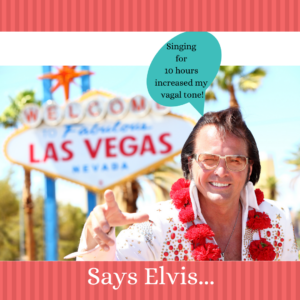"It's all about finding calm in the chaos" -- Donna Karan

What are the first words, thoughts, emotions that come to mind when you think of Las Vegas? Most likely casinos, gambling, drinks, drugs, shows, cars, Frank Sinatra, are perhaps the top of the list. "Sin City" and all its adrenaline-rush-glory! And ultimately, activation of sympathetic nervous system: Jacked-up, jack and coke, Jack ass, jack squat, Jack of clubs, hearts, spades and diamonds! To be clear, I’m not putting down Las Vegas at all. Vegas is an absolute ball, however, I find it Ironic that “Las Vegas” (and it's stereotypical affiliations) potentially counteracts the opposite intended, for the understated, but very important, vagus nerve in our body -- unless of course, you're receiving a massage or spa service.
Why is the Vagus Nerve important?
In Latin, “Vagus” means “wanderer”. Cranial Nerve X is the not-so-talked about vagus nerve, and the longest nerve in the human body, connecting the brain to important organs in your body, including the stomach, intestines, heart and the lungs. The Vagus Nerve is instrumental in activation of the Parasympathetic Nervous system which is “rest and digest.” It is highly influential on our breathing, digestive systems, and heart rate – all of which, greatly impact our health.
The visceral afferent (Sensory) branches of Cranial Nerves V, VII, IX, X and XI gather information from our visceral organs, communicating:
- Are we safe?
- Are we threatened or mortal danger?
- Does our body feel healthy or is there imbalance, pain, dysfunction of illness?
- These nerves also facilitate an optimal state of social engagement.
How Trauma impacts the Vagus nerve
Trauma vastly impacts functioning of the vagus nerve and social engagement with others. When we are faced with a threat (real or perceived), our breathing changes significantly. We shallow breathe into the lungs at a rapid pace, or breath hold, activating the sympathetic nervous system, which allows us to flight, flee or freeze. A trauma “lesion” which hasn’t been released through shaking or dispelled through body work, which will continue to wreak havoc on the body, maintaining activation of the sympathetic nervous system. It’s also true, when we continue to play out old scenarios (conscious or unconscious memories), the parasympathetic nervous system takes a back seat, sometimes resulting in a PTSD response within the brain-body.
In order to increase parasympathetic nervous system, we need to increase vagal tone. Sounds similar to doing Kegel exercises, or various other forms of exercise to tone our other muscles, but essentially that’s what we are doing when activating the vagus nerve; increasing vagal tone, which tempers down the Sympathetic Nervous System.

What is Vagal Tone?
Vagal tone is an internal biological process that represents the activity of the vagus nerve, and increasing your vagal tone activates the parasympathetic nervous system. Higher vagal tone means that your body can relax faster after stress or a stressful event. In 2010, researchers discovered a positive feedback loop between high vagal tone, positive emotions, and good physical health. In other words, the more you increase your vagal tone, the more your physical and mental health will improve, and vice versa. The vagal response also significantly reduces stress. It reduces our heart rate and blood pressure. It changes the function of certain parts of the brain, stimulates digestion, all those things that happen when we are relaxed.
Tips to increase Vagal Tone:
Cold Exposure
Acute cold exposure has been shown to activate the vagus nerve and activate cholinergic neurons through vagus nerve pathways. Exposing yourself to cold on a regular basis can lower sympathetic “fight or flight” response and increases parasympathetic activity through the vagus nerve. If you can withstand going outside in cold temperatures for short amounts of time with less clothing, this will train your vagus nerve, as well as taking cold showers. I guess there's more than one reason to take a cold shower! Turning the shower to cold water the last 30 seconds will help immensely, however, you can start by just immersing your face in cold water.

Deep and Slow Breathing
Deep and slow breathing activates the vagus nerve because of its connection to the diaphragm and lungs. Most people take about 10 to 14 breaths each minute. Learning to reduce your breath cycle to six breaths within a minute over time, will increase vagal tone. When you breathe deeply from your diaphragm, your stomach expands outwards. On the exhale, breathe long and slow. This is key to stimulating the vagus nerve and reaching a state of relaxation.
Singing, Humming and Chanting
The vagus nerve is connected to your vocal chords, at the back of your throat. Singing, chanting, humming and gargling will activate these muscles and stimulate the vagus nerve. The Humming Bee Breath is a good choice for activating vagal tone as the vagal tone passes by the inner ear and vocal chords. Breathe in through the nose and when breathing out, hum for the duration of the exhalation, vibrating your eardrum.
Massage
Massage stimulates the vagus nerve, increasing vagal tone. The vagus nerve can be stimulated by massaging specific areas in the body, such as the feet; decreasing fight-or-flight response, increasing vagal modulation and heart variability.

Meditation
Meditation is a powerful, relaxation technique which increases vagal tone. Research shows that meditation increases positive emotions and promotes feelings of goodness towards yourself. Meditation vastly decreases sympathetic nervous system activation and reduces “fight or flight” activity. In order for vagal tone to increase, we need to feel safe and secure. Meditation and prayer are powerful agents for connecting to the Divine, and reducing parasympathetic nervous system activation; allowing us to feel calm, safe, and secure.
Omega Fatty Acids
Omega-3 fatty acids are essential fats that your body cannot produce itself. They are found primarily in fish; high consumption of fish is associated with vagal activity and parasympathetic predominance. Omega-3’s are critical for the normal electrical functioning of your brain and nervous sytem; critical for brain and mental health. Omega 3’s also reduce heart rate.

Exercise
Exercise supports the brains mitochondria and increases your brain’s growth hormone. Moderate exercise also stimulates the vagus nerve which is beneficial to the brain and mental health effects. Just walking for 30 to 60 minutes a day, is highly effective with increasing vagal tone.
Probiotics
Gut bacteria improves brain function by positively affecting the vagus nerve. Researchers have found positive changes to GABBA receptors in the brain and a reduction in stress hormones with less depression and anxiety-prone behavior when given the probiotic Lactobacillus Rhamnosus. These beneficial changes between the gut and brain are facilitate by the vagus nerve.
Socializing and Laughing
Socializing and laughing reduces cortisol levels and stimulates the vagus nerve. Positive social interaction and connections improves vagal tone and influences positive emotions. Laughter has been shown to increase heart-rate variability and improve mood. Vagus nerve stimulation often leads to laughter as a side effect, suggesting they are connected and influence one another.
Preventatives
Stress, anxiety and fatigue cause the vagus nerve to misfire. It is essential to reduce stress and anxiety by implementing strategies which work for you to keep it at bay. Getting adequate sleep at night, and taking short naps during the day will aid in improved vagal tone. The excess of spicy food and alcohol can cause the vagus nerve to misfire, leading to increases Sympathetic nerve activation. Poor posture and musculature misalignment may also put pressure on the vague nerve. Yoga, stretching, and calisthenics facilitate improved posture and alignment, positively impacting vagal tone.
Conclusion
And there you have it! These are all effective tips, and all of which I use on a regular basis, to maintain high vagal tone. If you endured trauma as a child, as I did, you will mostly likely have low vagal tone (to start with), however, with continued perseverance, you can take control of your health and wellness, by increasing your vagal tone. Increased vagal tone with increased parasympathetic nervous system activation, his has an overall calming effect on your entire body. You will absolutely reap the benefits, when practicing these techniques intentionally and with regularity. Your body will profusely thank you.
So the next time you go to Vegas, you'll have control over your vagus!
© 2020 by Jodi Lawyer, M.A., OTR/L. Helix Healing Path. All rights reserved. You may quote, copy, translate and link to this article in its entirety, on free, non-donation based websites only, as long as you include the author name and a working link back to this website. All other uses are strictly prohibited.


